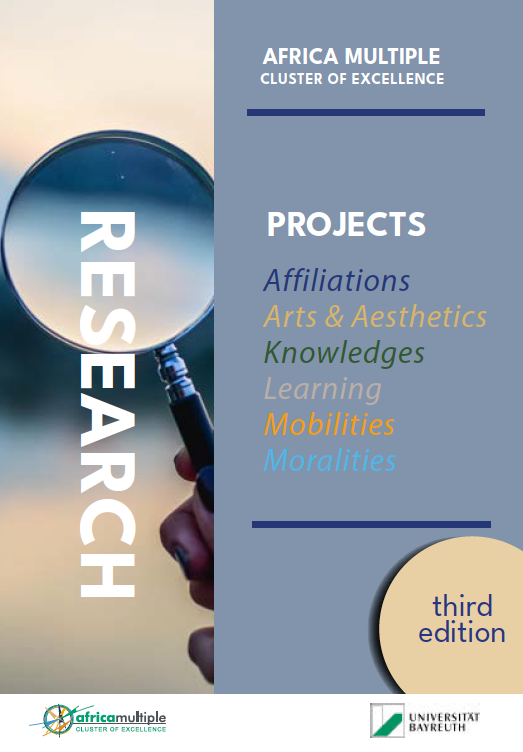Intra-Africa Migration and Xenophobia:The Imperatives for African Integration
-
Research Section: Mobilities (in synergy with “Affiliations”)
-
Project duration: 01.07.2020 - 31.10.2021
Summary
The project investigates the mobility of West African migrants using Lagos and Ouagadougou as research contexts. In this project we set out to ascertain the integration of migrants in their destination context by juxtaposing their occupational
engagements in terms of accessibility to the formal or informal sector. The migrants’ accessibility to education, health care and if they suffered any form of conflict or molestation to capture the existence or otherwise of xenophobia in the two countries. To achieve the set objectives 1000 questionnaires were administered in Lagos and Ouagadougou (500 in each context). The results of the study showed that migrants in Ouagadougou and Lagos operate in the informal sector of the economy either as petty traders, food vendors, transporters etc. Migrants in Ouagadougou had equal access to public education as citizens whereas the reverse was the situation in Lagos. For health care, 99.8% of migrants in Ouagadougou had access to health care. Interestingly, migrants in Lagos experienced some form of fear as 24.60% expressed the desire to return to origin context as against only 3.10% in Ouagadougou. The study shows that migrants in Ouagadougou are completely integrated and therefore do not desire to return. The fear expressed by some migrants in Lagos negates the spirit and letters of the ECOWAS Protocol and thus, negates the AU migration policy framework 2018–2030.
Key questions
- What is the nature of African migrants’ access to public education, health, political activities, and social services that can integrate them into the host communities?
- To what extent does the nature of the foregoing access determine the security of African migrants in their host communities?
- How does the security of African migrants determine their investments preferences in their host communities?
- What are the roles played by the foregoing and other factors in the conflicts between migrants and the host communities?
- To what extent do the ECOWAS and AU migration policies help to address identified problems and resolve the manifest
contradictions? - How will all these provoke new ECOWAS/AU policies for African integration while assisting in the reconfiguration of African Studies?
Methods and concepts
The study was conducted using a hybrid of quantitative and qualitative methods. Source of data were migrants (both documented and undocumented) working in the informal sectors of the two countries’ economies. The questionnaire contained both open-ended and close-ended questions. This helps to elicit the required information from the respondents. Questionnaires were administered to the sample population which includes individuals who have spent at least two years in the host country and operating in the informal sector of the economies of both contexts. Such individuals work as security guards, commercial motorcycle operators, nannies, gardeners, tailors, labourers, farmhands, commercial sex workers, petty traders, among others. This group of people are found in the two locations of the study – Nigeria and Burkina Faso. Qualitative data were generated using the key informant interview (KII) and the in-depth interview (IDI) methods. Key informants for the study include NGOs and other Civil Society Organizations involved in migration. Examples of these organizations are country branches of International Organization for Migration (IOM), National Agency for the Prohibition of Trafficking in Persons (NAPTIP), Nigerians in Diaspora Commission (NIDCOM), and other local organizations in both Nigeria and Burkina Faso. Stakeholders including local government officials in the contexts.
Vision of the study
The vision articulated by the researchers is to use migration as a development tool in West Africa in line with De Haas, and other scholars. The fluidity of mobility within the West African corridor shows the artificiality of West Africa borders as it does not hamper the movement of persons. Ensuring the workability of the ECOWAS protocol will enhance trade and create jobs for the army of the unemployed. Creating efficiency along the border regions will make the unofficial routes unattractive and checkmate the influx of small arms and light weapons which exacerbates insecurity in the subregion. Cooperation from ECOWAS member states will drive the letters of the protocol and create better economic climate.
Contribution or relation to the Clusters aims & goals
The African Cluster Centers of Excellence in collaboration with the University of Bayreuth were established for the reconfiguration of African studies. This study domiciled at the ACC Lagos, set out to provide a nuanced insight to the understanding of migration in West Africa. The aim being to help states to reposition their national policies on migration for greater cohesion and the elimination of all forms of xenophobia in the subregion. West Africans should be free to move and settle across the subregion in the spirit of ECOWAS. Migrants should not suffer any form of discrimination or fear in keeping with the AU Migration Policy Framework 2018–2030. Thus, achieving better wellbeing for every African.
Project Team

Dr. Franca Attoh
Principal Investigator, University of Lagos, Nigeria

Dr. Olukayode Segun Eesuola
Co-Principal Investigator, University of Lagos, Nigeria

Dr. Samuel Ojima Adejoh
Expert in Methodology Department of Social Work, University of Lagos, Nigeria

Dr. Godwin Okeke
Political Scientist, University of Lagos, Nigeria
Further links / key references
- Attoh, F. (2021). “Migration and Border Conflicts in Africa.” Iwuagwu, I. (ed), Nation Building in Africa: Issues, Challenges and Emerging Trends, Lagos: University of Lagos Press and Bookshop Ltd, 293–320
- Attoh, F. (2019). Mobility, Migration, and its Discontents: Insights from Nigeria. (IOSR-JHSS). Vol. 24, Issue 3, (March.2019)
43–54. e-ISSN:2279-0837, p-ISSN:2279-0845. - De Haas, H. (2010). Migration and Development: A Theoretical Perspective. International Migration Review, Vol. 44, Issue 1. pp. 227–264 (open access).





